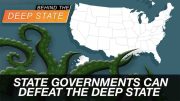
On June 29, a secret court ruled that a federal court and Congress were wrong to end the NSA’s bulk collection of phone metadata; therefore, the mass surveillance can carry on as before — for now.
National Journal reports: “The Foreign Intelligence Surveillance Court [FISC] approved a government request to renew the dragnet collection of U.S. phone metadata for an additional five months—a timeframe allowed under the Freedom Act, a newly enacted surveillance reform law that calls for an eventual end to the mass spying program exposed by Edward Snowden two years ago.”
Although its use has been perfected by the current occupant of the Oval Office, the so-called FISA Court (officially the Foreign Intelligence Surveillance Court) began to be used as a tool for rubber-stamping unwarranted surveillance in the Bush administration.
The FISA Amendments Act was signed into law by President George W. Bush on July 10, 2008 after being overwhelmingly passed 293 to 129 in the House and 69-28 in the Senate. Just a couple of days prior to FISA being enacted, then-Representative Ron Paul led a coalition of Internet activists united to create the political action committee Accountability Now. The sole purpose of the PAC was to conduct a money bomb in order to raise money to purchase ad buys to alert voters to the names of those congressmen (Republican and Democratic) who voted in favor of the act.
{modulepos inner_text_ad}
The FISC is more powerful and autonomous than even Ron Paul likely imagined.
In his opinion, FISC judge Michael W. Mosman ruled, “Second Circuit rulings are not binding on the F.I.S.C. and this court respectfully disagrees with that court’s analysis, especially in view of the intervening enactment of the U.S.A. Freedom Act.”
That’s right. The court, established specifically to judge the merits of applications by the government to spy on citizens, gave a green light to the NSA to keep spying on Americans, ignoring completely the will of the people, their representatives in Congress, and the plain language of the Fourth Amendment to the Constitution.
Specifically, the ruling gives the NSA until November 29 to find a way to transfer power over the wiretapping to big business. As Voices of Liberty reports, “By that time, the NSA will have to be fully transitioned to meet the USA Freedom Act standards, requiring the bulk data collection be done by telecommunication corporations.”
In other words, although Congress cut off the bulk surveillance program on June 1, the secret court has now overruled that decision and placed itself above the legislature.
After November, the NSA will have to turn to its allies in the telecommunication industry for access to the data that these service providers will continue collecting.
Just how cooperative will the telecoms be? Consider this 2013 article in The New American:
The U.S. Department of the Interior has selected Verizon to participate in a $10 billion, 10-year contract to provide cloud and hosting services. This is potentially one of Verizon’s largest federal cloud contracts to date.
Verizon is one of 10 companies that will compete to offer cloud-based storage, secure file transfer, virtual machine, and database, Web, and development and test environment hosting services. The company is also one of four selected to offer SAP application hosting services.
Each of the 10 agreements awarded under the Foundation Cloud Hosting Services contract has a potential maximum value of $1 billion.
Put simply, not only has Verizon not suffered a loss of customers since revelations of its collusion with the National Security Agency’s dragnet surveillance of millions of Americans’ phone records, but now the company is being paid billions for its cooperation.
In justifying its exaltation of its own judgment over that of the Second Circuit Court and Congress, the FISC stated in its ruling:
“To a considerable extent, the Second Circuit’s analysis rests on mischaracterizations of how this program works and on understandings that, if they had once been correct, have been superseded by the USA Freedom Act.”
Mischaracterizations? Perhaps that’s what constitutionalists are doing when they take the Fourth Amendment literally when it guarantees that
The right of the people to be secure in their persons, houses, papers, and effects, against unreasonable searches and seizures, shall not be violated, and no warrants shall issue, but upon probable cause, supported by oath or affirmation, and particularly describing the place to be searched, and the persons or things to be seized.
One senator isn’t comforted by the FISC’s redefinition of the law.
Senator Ron Wyden (D-Ore.) is a frequent foe of the NSA’s bulk collection program, and on June 30 he released a statement on his website criticizing the secret court’s revival of the data collecting scheme:
I see no reason for the Executive Branch to restart bulk collection, even for a few months. This illegal dragnet surveillance violated Americans’ rights for fourteen years without making our country any safer. It is disappointing that the administration is seeking to resurrect this unnecessary and invasive program after it has already been shut down. However I am relieved this will be the final five months of Patriot Act mass surveillance, thanks to the passage of the USA Freedom Act. It will take a concerted effort by everyone who cares about Americans’ privacy and civil liberties to continue making inroads against government overreach.
But for the time being, every citizen is now a suspect and the scope of the surveillance is being expanded to place every word, every movement, every text, every conversation, every e-mail, and every social media post under the never-blinking eye of the federal domestic spying apparatus.
The hour is now late if this Republic is to remain a land under the rule of law. To that end, it is critical that Americans recognize that the FISA Court’s rubber stamping of the exercise of such sweeping surveillance programs is in direct, open, and hostile violation of the Constitution.
Much of what is being done by the FISA Court is very similar to the Star Chamber, an English court of the 14th to 17th centuries that met in secret, with no record of indictments, no identification of witnesses, and no transcript of the proceedings.
Eventually this court was used as a political weapon — a way for the king and the Parliament to persecute their enemies and keep the dirty details hidden from the public.
The analogy of the FISA Court’s absolute approval of requests by the government to monitor citizens’ electronic communication to the decisions of the Star Chamber is apt and accurate on many points.
The policies that permit this data sharing and grant such secret authority to the NSA and the FISA Court are such a shameful disregard for our long history of individual-based human and civil rights (including the freedom from unwarranted searches and seizures) that it shocks the conscience even when the source is considered.
The FISA Court’s decision demonstrates that the government considers the protections of the Fourth Amendment to be nothing more than a “parchment barrier” that is easily torn through. The Obama administration — and the Bush administration before it — regards the Constitution, the separation of powers, and the Bill of Rights as advisory at best.
Judge Mosman summed up this constitutional crisis perfectly in the first line of his order of June 29 reviving the surveillance:
“Plus ça change, plus c’est la même chose.”
Which, roughly translated from the French, means: “The more things change, the more they stay the same.”



